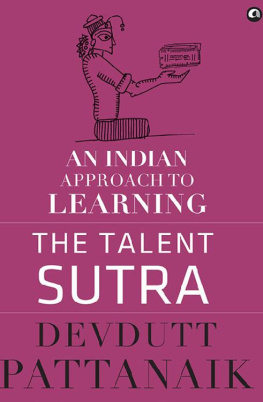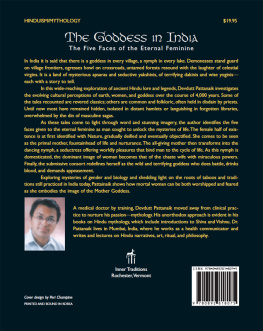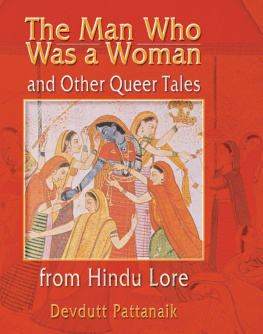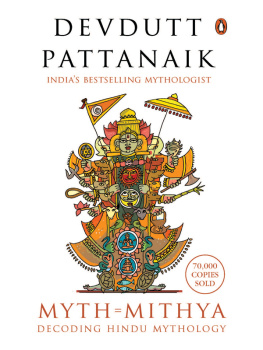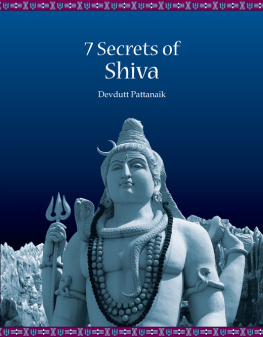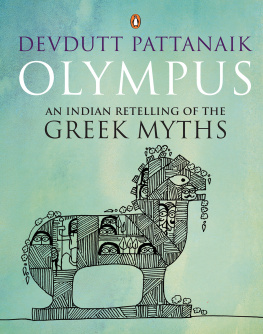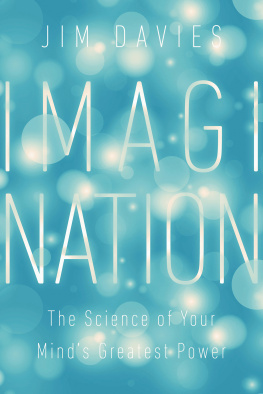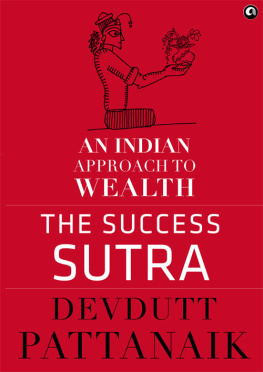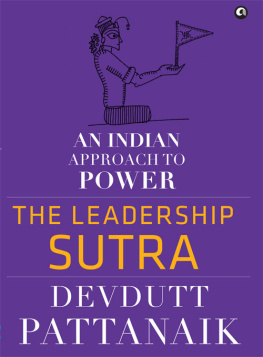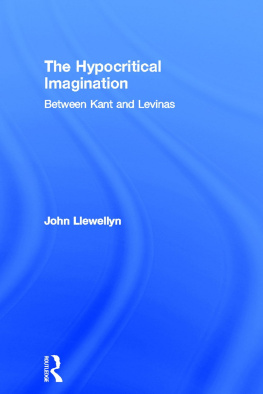ALEPH BOOK COMPANY
An independent publishing firm
promoted by Rupa Publications India
First published in India in 2016
by Aleph Book Company
7/16 Ansari Road, Daryaganj
New Delhi 110 002
Copyright Devdutt Pattanaik 2016
All rights reserved.
The views and opinions expressed in this book are the authors own and the facts are as reported by him/her which have been verified to the extent possible, and the publishers are not in any way liable for the same.
While every effort has been made to trace copyright holders and obtain permission, this has not been possible in all cases; any omissions brought to our attention will be remedied in future editions.
No part of this publication may be reproduced, transmitted, or stored in a retrieval system, in any form or by any means, without permission in writing from Aleph Book Company.
ISBN: 978-93-84067-87-8
This book is sold subject to the condition that it shall not, by way of trade or otherwise, be lent, resold, hired out, or otherwise circulated without the publishers prior consent in any form of binding or cover other than that in which it is published.
Also by Devdutt Pattanaik
The Leadership Sutra: An Indian Approach to Power
My Gita
The Success Sutra: An Indian Approach to Wealth
Business Sutra: A Very Indian Approach to Management
Contents
Introduction
Saraswati is the goddess of knowledge in Hinduism, as well as in Buddhism and Jainism. Her name is derived from fluidity (saras) of the imagination. Human imagination enables us to invent and innovate, visualize, plan and de-risk. Yet imagination is a bad word in the world of business and management. It strips us of certainty. We want to control the imagination of those who work for us, prevent their minds from wandering from work. Yet every human being lives in an imagined reality. Recognizing this enables us to work with talent, build strong relationships and nurture people to face any situation with faith and patience. Failure to recognize imagination is why family-owned businesses are unable to manage professionals and how professionally-run companies end up creating ineffective mechanistic talent management systems. Training, learning and development, are not just about skills and knowledge and competencies, they are about appreciating the human-animal, recognizing that neither we nor those around us are programmable machines that we can plug and play. Managing people, hence relationships, is key to the survival of an organization. Hence, The Talent Sutra, a work derived from my book on Indian approach to business and management, Business Sutra, focuses on sutras related to creativity in the workplace, nurturing talent and the importance of teamwork.

Ideas in this book are provided in the form of sutras. Sutra (the word or concept) has two meanings:
- It means a string meant to join dots to create a pattern. The book strings together myriad ideas from Jain, Hindu and Buddhist traditions to create a synthesized whole that helps us understand the Indian way. Likewise it strings together Greek and biblical ideas to understand the Western way and Confucian and Taoist ideas to understand the Chinese way. Each one of these garlands are man-made and reveal my truth, not the truth.
- Sutra also means an aphorism, a terse statement. The book is full of these. They are like seeds which, when planted in the mind, germinates into a plant. The nature of the plant will depend on the quality of the mind. Indian sages avoided the written word as they realized ideas were never definitive; they transformed depending on the intellectual and emotional abilities of the giver as well as the receiver. Thus an idea is organic. Many sages chose symbols rather than sutras to communicate the idea. What appears like a naked man to one person, will reveal the nature of the mind to another. Both are right from their point of view. There is no standard answer. There is no correct answer. The point is to keep expanding the mind to accommodate more views and string them into a single whole.
These sutras are made in India but are for the world, for they complement modern management by drawing attention back from profit, through hunger, to humanity.
THE TALENT SUTRA
Isolation Reflection Expansion Inclusion
T he ability to see the human quest for identity is darshan. The identity of a person or sukshma-sharira is how he imagines himself. And this identity depends on brahmanda, how he imagines the world. Identity and worldview are thus manas putra, the children of Brahmas imagination.
Imagination is fluid, or saras. Our imagination of the world, hence ourselves, keeps changing all the time. It will change with context or with better observation. If in one context, we may see ourselves as heroes, in another we may see ourselves as victims or martyrs. Initially, we may see the employer as a saviour; but over time, with more information, on closer inspection, we may see the employer as the oppressor and ourselves as the oppressed. From saras comes Saraswati, goddess of knowledge. Knowledge is fluid; springing from imagination, constantly shape shifting, with the potential to expand towards infinity.
In the Brahma Puran, brahmanda is referred to as Brahmas daughter, his creation. She is Shatarupa, she of many forms, a reminder of her fluid nature. In the Shiva Puran, Brahma is accused of having incestuous affection for his daughter. This must not be taken literally (as it often is). It is a metaphor for how every human being clings to his creation, his subjective reality, convinced it is objective reality. The child of this incestuous liaison is our identity, also assumed to be objective and fixed. Shiva attacks and beheads Brahma, hoping he will abandon this imagined identity that makes him dependent and needy, but Brahma resists.
We constantly seek an endorsement of our identity. We adore those who see us as we imagine ourselves. Nature refuses to do that. Nature does not care if one is a doorman or director, but an organization does. The social identity, however, ceases to matter when the context changes. A military general may be valued during a war but not so much in peace. A cultures endorsement of our identity is thus occasional, conditional and temporary. This fills us with the fear of invalidation, a uniquely human fear, the greatest of fears that makes every human being feel dreadful, miserable and invisible.

Some react to this invalidation by seeking escape: either in work, entertainment or alcohol. Others seek an adrenaline rush to feel alive, anything from extreme sports to gambling. Still others turn to gluttony and greed, perversions and pettiness, grabbing more wealth and power in a bid to punish nature or culture itself. These may be condemned in society as vices, but they are in fact the cry of victims of imagination, desperately seeking meaning.

